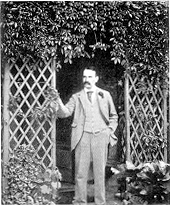|
|
A Month in an English Poorhouse,
Page 4 of 9
lief for a married couple is four shillings and sixpence ($1.12) weekly, and for a widow, three shillings (75c.). Until recently this dole was, in the quaint old English fashion, “half a crown and two loaves.”
The number of inmates at O______ Union averages about seventy. At the time I happened to make inquiry, there were thirty-nine men, twenty-three women and eleven children. Formerly there were many more children, so many that a separate school for them was maintained in the house, and a competent schoolmistress retained on the staff; but during late years the practice has obtained of getting as many as possible of the children homes outside, where they can work for their board and go to school. The few remaining in the house, of school age, attend the regular schools in the town. The total expenses of this Union were, in round numbers, £3600 for the year ending last “Lady Day,” the 25th of March, which is in England the closing day of the fiscal year. From a quarter to a third of this was probably devoted to out-door relief, the rest representing the running expenses of the house. This provides, as I have said, for the poor of thirty-nine parishes; but the English parish varies so much in size that a better idea of the territory covered can be gained from the fact that the nearest Union on one side is seventeen miles distant, and on the other, thirteen. Whether the present system of caring for the poor best combines efficiency and economy is one of the public questions which is being much discussed in England to-day. The inmates of the Union are generally old people, cripples, feebleminded persons, and young children. Very few of these, however, will be absolutely helpless, and all who are able are expected and encouraged to do such light work as they can towards keeping up the establishment. The men take all the care of the grounds and gardens. The matron is allowed a capable maid, hired outside, for her own assistance, but she is the only paid servant about the place. Those who are best able to act as nurses care for the more helpless. By a recent law, every Union is obliged to retain a capable trained nurse to oversee this work and care for those who are seriously ill. Special rooms, large, light and airy, filled with fresh, clean beds, furnish ample accommodation for those who are ill or helpless. A part of one of the front wings is fitted up as a laundry, and all the work for the house is done here, much of it by women who are strong physically but feeble in mind. One of the prettiest places about the grounds is the clothes yard, where, shut in by a hawthorn hedge, there is a big expanse of green turf, soft as plush, on which the wash is spread to whiten or above which it hangs to dry. It rarely happens that there are not enough able-bodied and capable women in the Union to do the cooking and all the other necessary work of the house. These are usually homeless women with children, often illegitimate, so young that the mothers are temporarily unable to go out to service, to which, as soon as their children get old enough, they return. |
|
|
4
Books & articles appearing here are modified adaptations
from a private collection of vintage books & magazines. Reproduction of these pages is prohibited without written permission. © Laurel O'Donnell, 1996-2006.
|
||


